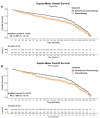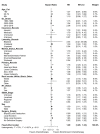The Association of Radiation Therapy and Chemotherapy on Overall Survival in Merkel Cell Carcinoma: A Population-Based Analysis
- PMID: 34722054
- PMCID: PMC8545516
- DOI: 10.7759/cureus.18276
The Association of Radiation Therapy and Chemotherapy on Overall Survival in Merkel Cell Carcinoma: A Population-Based Analysis
Abstract
Purpose/objective(s) Merkel cell carcinoma (MCC) is a rare, aggressive cutaneous neoplasm traditionally managed with surgical resection followed by radiotherapy (RT). With the recent approval of checkpoint inhibitors, chemotherapy is less commonly utilized. We analyzed the impact of RT and chemotherapy on overall survival (OS) in patients with MCC using Surveillance, Epidemiology, and End Results (SEER), a population-level database. Materials and methods We performed retrospective analyses on SEER 18 Custom Data registries for MCC (ICD-0-3 8247). Data from 1980 to 2016 was queried for analysis, and an initial list of 9,792 patients was populated (ICD: C00, C07.9, C44, C80.9). Selection for cases with chemotherapy and RT status, single primary tumor, primary tumor location and surgery treatment type yielded 5,002 cases for analysis. Baseline characteristics were compared with Chi-square or Mann-Whitney U test. Univariate and multivariable analysis using Kaplan-Meier and Cox proportional hazards regression modeling were performed. Propensity-score matched analysis with inverse probability of treatment weighting (IPTW) was used to account for indication bias. Results Median follow-up time was 178 months (68 to 217 months). Independent prognostic factors positively correlated with increased OS, for both unadjusted Multivariate analysis and IPTW adjusted MVA were age, male sex, year of diagnosis, stage, RT status, and chemotherapy status. On adjusted MVA, use of chemotherapy was associated with worse OS (hazard ratio: 1.22 [95% CI 1.1-1.35], p<0.001), whereas RT was associated with improved OS (HR:0.9 [95% CI, 0.83-0.97], p=0.008). Conclusions The current study demonstrates that RT is associated with improved survival for patients with MCC. Chemotherapy was associated with worse OS. This supports the recent clinical shift towards immune checkpoints inhibitors as standard of care in the metastatic setting, and promising trials in the adjuvant and advanced settings.
Keywords: chemo radiotherapy (chemo-rt); chemotherapy; merkel cell carcinoma; overall survival; radiation therapy; radiotherapy.
Copyright © 2021, Vayntraub et al.
Conflict of interest statement
The authors have declared that no competing interests exist.
Figures



References
-
- Recurrence after complete resection and selective use of adjuvant therapy for stage I through III Merkel cell carcinoma. Fields RC, Busam KJ, Chou JF, et al. Cancer. 2012;118:3311–3320. - PubMed
-
- Merkel cell carcinoma: current management and controversies. Prewett SL, Ajithkumar T. Clin Oncol (R Coll Radiol) 2015;27:436–444. - PubMed
LinkOut - more resources
Full Text Sources
